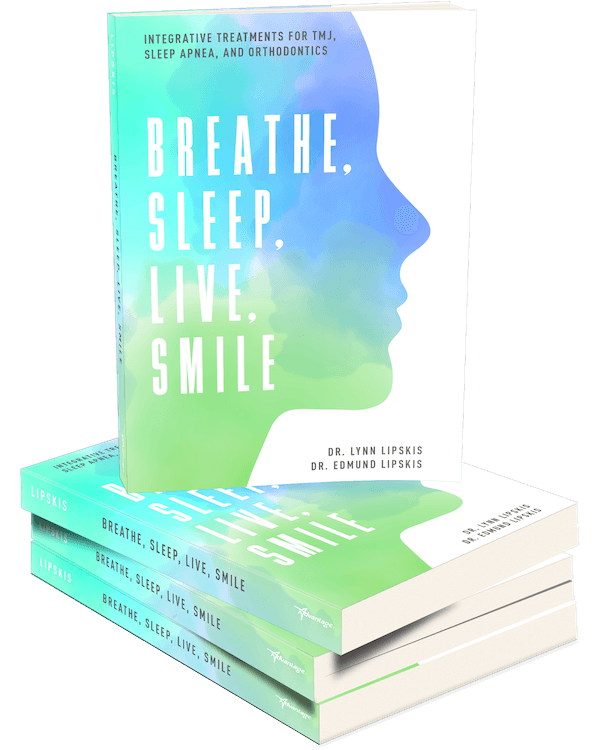You are experiencing a few TMJ/TMD or sleep apnea-related symptoms…
But don’t worry, you have options! Let’s start with a more in-depth look into your health.
It is not only our belief, but our experience, that by improving your smile, we can improve your sleep, health, happiness, and change your entire quality of life.
Why? It’s all connected to your ability to breathe.
The importance of breathing to maintain life is second to none. Humans can go 40 days without food, and eight days without water—but only minutes without air. Oxygen is the most important nutrient for the human body. Without proper breathing during sleep, which will deprive the body of oxygen, all sorts of problems develop. That includes physical and psychological conditions, which can be life-threatening, along with cognitive issues.
Problems resulting from poor sleep
- Hypertension, heart disease
- Abnormal growth patterns
- Asymmetry of the face
- Cognitive deficits
- ADHD like symptoms
- Sleep apnea
- TMJ/TMD
- Joint issues
- Sore neck or back
- Diabetes
- Weight gain, obesity
- Excessive daytime sleepiness
- Erectile dysfunction
- And premature death
Luckily, with intervention and treatment, these effects are preventable!
We’ve helped countless patients transform their health’s with orthodontics. By addressing the root cause of the problem, we create a life-long solution to your health concerns.
In the meantime, here are some tips from our book, Breathe, Sleep, Live, Smile, for getting a better night’s sleep:
Keep it quiet. Chances are, anyone living next to the L-train in Chicago is going to have a little trouble sleeping. Ideally, the bedroom should be a place of silence. That means no TV, no ticking clocks, no smartphone beeping out endless notifications. If outside noises can’t be prevented, consider purchasing earplugs or a machine that produces white noise—such as a room fan or a sleep machine.
Douse the lights. The body needs darkness to regenerate. That’s because of the circadian rhythm, an internal “clock” of the body’s sleep/wake cycles. The circadian rhythm tends to follow the cycle of day and night, which is one reason why it can be tougher to stay awake in the winter months when the days are shorter. To promote a more regular cycle, it’s important to have a bedroom that is cool and dark, void of lights. Block out lights from outside the room with room-darkening shades. And cover or remove lights in the room that can disrupt sleep. From alarm clocks to TVs to nightlights, even the green lights on smoke alarms, turn off or cover the lights for a better night’s sleep.
Clean up the clutter. Clutter can be distracting, keeping your mind awake when all you want to do is sleep. Remove papers and other clutter that has nothing to do with getting some rest. Using a journal to write down all the things you are trying to remember prior to sleeping reduces the clutter in your brain.
Eat in the dining room—not the bed. Avoid eating food in bed. In fact, avoid eating anything heavy or stimulating for several hours before going to bed.
Work in the office—not the bedroom. Avoid doing work in bed as well. No reading emails, no reading of any sort. The goal is for your mind to be ready to rest when your head hits the pillow.
No caffeine or alcohol. Caffeine—even decaf—can stay in your body for hours, so be sure to have the last caffeinated drink of the day early in the afternoon. And contrary to popular belief, alcohol doesn’t help you sleep—it’s a stimulant. Red wine also increases inflammation of nasal tissue causing your nose to be more blocked (think snoring). So avoid that nightcap before heading off to sleep.
Take a bath. A drop in body temperature can induce sleep. Take a nice, warm bath or shower an hour before bedtime, and as your body temperature lowers, you’ll fall asleep easier. Using Epsom salts in your bath prior to bedtime will also aid sleep by acting as a muscle relaxant.
Comfy bedclothes. Sleep is so much easier when you have a comfortable mattress, an appropriate pillow, and soft, clean sheets.
Keep it timely. Avoid naps and try to form a regular routine of when you go to bed, and when you wake up—even on weekends and your days off.
Ready to take your next steps towards a brighter smile and healthier life?
Great! To learn more about how we can improve your smile and your quality of life, visit our website. There, you can find information on our treatment options, schedule an appointment, and ask us questions directly. We’re never too busy for you! We’d love to talk with you about making your (or your child’s) smile as bright as it can be!
Order a copy of our book, Breathe, Sleep, Live, Smile, for more insight into how the health of your mouth affects the health of your entire body!
Let’s Connect
Follow Lynn on LinkedIn and Ed on LinkedIn. Or reach out to us on Facebook, and Twitter.

DRS. LYNN AND ED LIPSKIS
Over 35 years of experience, Drs. Lynn and Ed Lipskis are passionate about using what they’ve learned to help patients find lasting relief.
Learn More
BREATHE, SLEEP, LIVE, SMILE
Integrative Treatments For TMJ/TMD, Sleep Apnea, and Orthodontics
This is a guide to navigating your treatment options for chronic pain related to the face, jaw, and airways.
About The Book